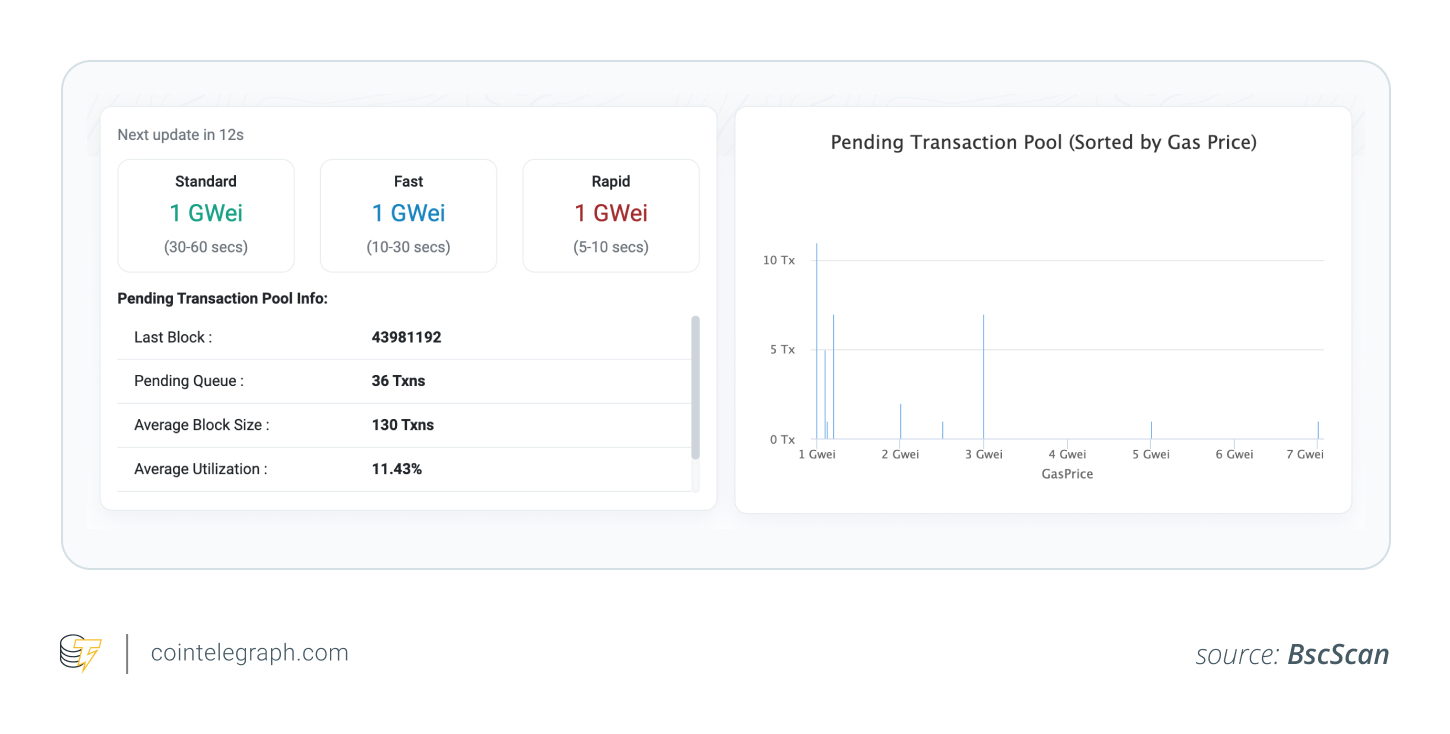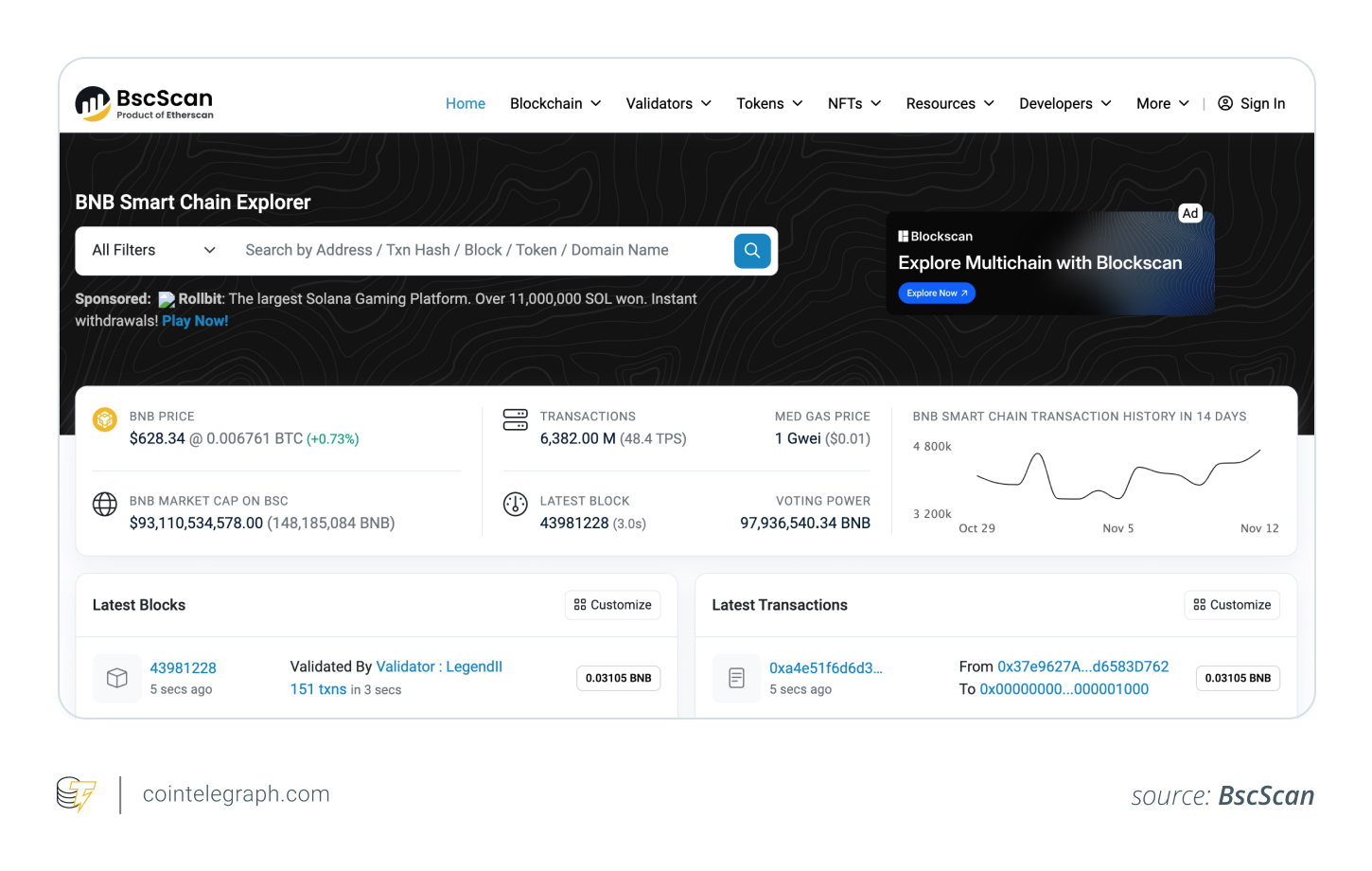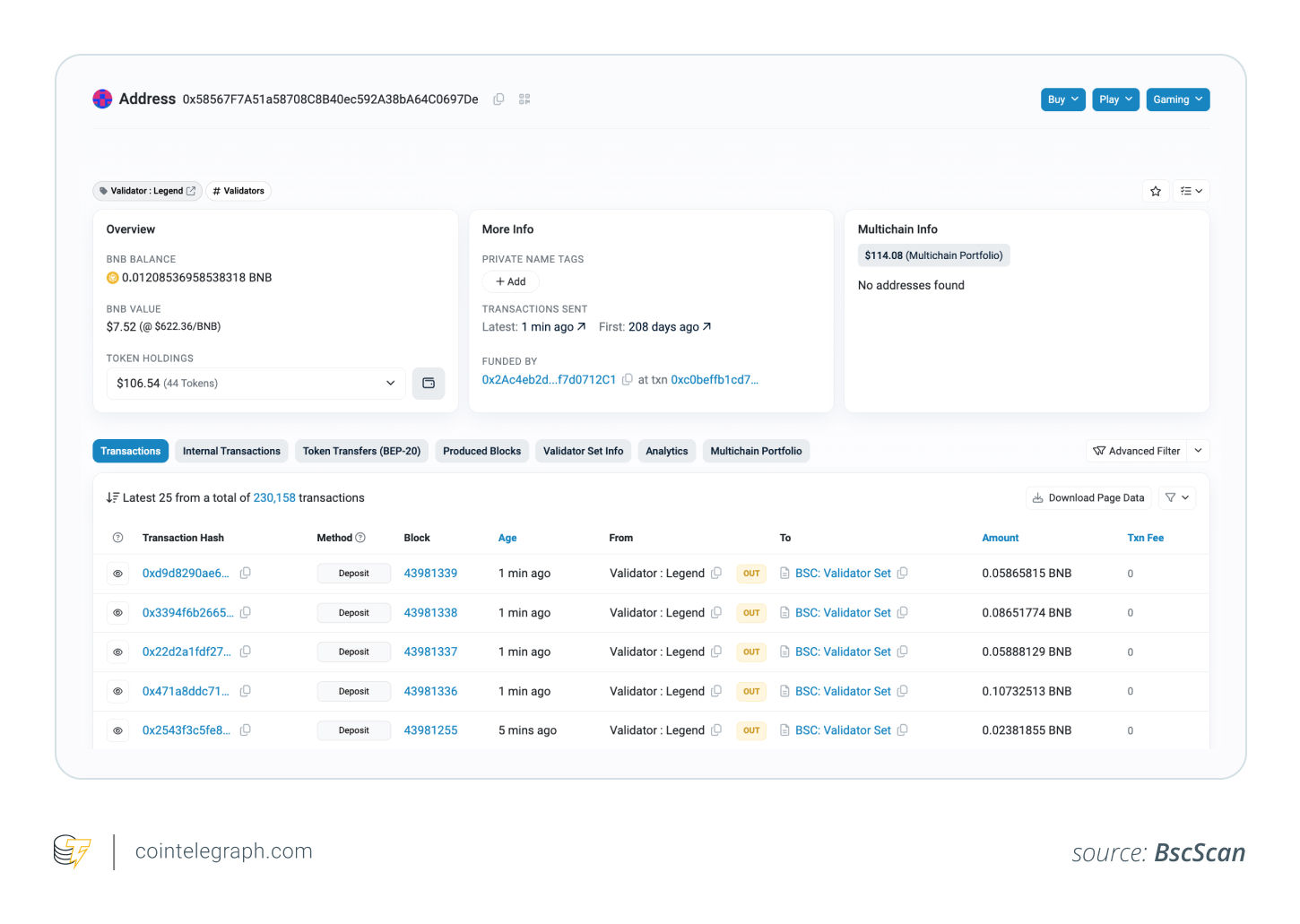Key takeaways
- BscScan is a blockchain explorer designed for BNB Smart Chain (BSC), giving users a clear window into BSC’s activity.
- BscScan lets you monitor transaction details, such as status, fees and confirmations, helping you track everything from your transfers to troubleshooting failed transactions.
- You can input any wallet address to check balances, transaction histories and BEP-20 token holdings. It’s a great way to keep an eye on your assets or explore public wallet activities.
- You don’t need to be a developer to interact with smart contracts. BscScan allows users to read and engage with contracts directly on the platform.
BscScan is your go-to tool for exploring the BNB Smart Chain (BSC) blockchain. It is a powerful tool for exploring the BNB Smart Chain (BSC) blockchain, giving users a clear, easy-to-understand view of what’s happening on the network.
Whether you’re tracking transactions, exploring wallet balances or interacting with smart contracts, BscScan simplifies it all. No coding skills are needed. It’s a must-have for developers, investors and anyone who wants to dive deeper into BSC’s onchain data.
This article covers how to use BscScan to track BSC transactions, explore wallet balances, and interact with smart contracts. It walks through the key features such as transaction tracking, token analytics and gas fee monitoring, along with a step-by-step guide on navigating the platform.
Additionally, it delves into advanced tools for developers, like APIs and smart contract verification, and explains how to interpret the data on BscScan effectively.
What is BscScan?
In simple terms, BscScan lets you “see” what’s happening on the blockchain. It provides a user-friendly interface where you can search for transactions, wallets, smart contracts and tokens on BSC. Whether you’re a developer, investor or just curious, BscScan makes it easy to view and verify onchain data without needing technical skills.
You might wonder how BscScan compares to other blockchain explorers, like Etherscan. Etherscan is widely known as the standard for Ethereum, offering similar features tailored to that network. Since BSC is an Ethereum-compatible chain, BscScan functions almost like a mirror image, but for BSC’s specific structure and data.
With easy access to transaction details and contract data, users gain a sense of security and reliability, knowing they can verify what’s happening onchain.
Did you know? BscScan was actually developed by the same team behind Etherscan and launched in 2020. The team is led by Matthew Tan.
Key features of BscScan
BscScan comes packed with features designed to make navigating BNB Smart Chain straightforward and insightful, whether you’re tracking a transaction, checking wallet activity or even developing on the network.
Here’s a breakdown of BscScan’s most useful tools:
Transaction tracking
One of BscScan’s core features is transaction tracking. With just a transaction ID, you can see if it’s complete, check its block confirmations, and view details like the amount transferred, sender and receiver addresses, and associated fees. This feature is especially useful for confirming your transactions or troubleshooting failed ones, making BscScan a must-have for any BSC user.

Wallet exploration
BscScan allows you to explore wallet balances and transaction histories in detail. You can input any wallet address to see its balance, past transactions and any BEP-20 tokens it holds. This is a handy feature for tracking your own crypto holdings or examining public wallet activity in the network — just remember to use this tool ethically, as all activity on BSC is publicly accessible.

Smart contract interaction
With BscScan, you don’t need special developer software to interact with smart contracts on BSC. You can access, read and interact directly with smart contracts via BscScan’s interface. This feature is especially valuable if you’re involved with decentralized apps (DApps) or need to validate what a contract is set to do before interacting with it.

Token analytics
Curious about the latest BEP-20 tokens on BSC? BscScan offers an in-depth view of token metrics, including price, trading volume, holder distribution and contract details. You can check specific token movements, track their popularity, and even analyze their distribution among wallets to gauge community interest or spot any suspicious concentration of holdings.

Gas fee monitoring
No one wants to overpay on gas fees. BscScan includes a real-time gas tracker that lets you see current gas prices across different transaction speeds — slow, average or fast. With this tool, you can plan your transactions when fees are lower, helping you keep costs down and avoid sudden price hikes.

Developer tools
For developers, BscScan offers a range of resources, from APIs to data export options, enabling easy integration with BSC data in your own apps or analytics projects. The API allows access to various types of blockchain data, including transactions, token balances and contract events. These tools make it easier for developers to build, monitor and manage applications on BSC without needing extensive infrastructure.
Did you know? While people often think blockchain transactions are private and anonymous, they are actually pseudonymous, meaning wallet addresses are visible but not directly tied to personal identities. Privacy can be enhanced through careful use of addresses, but all transaction details, like amounts and wallet interactions, remain accessible to anyone on the network.
Getting started with BscScan: Step-by-step guide
Whether you’re tracking transactions, checking wallet balances or analyzing tokens, BscScan provides a user-friendly interface to access onchain data.
Here’s how to get started with BscScan:
Navigating the BscScan interface
- Homepage overview: Visit BscScan to access the homepage, which displays key statistics like BNB’s (BNB) price, market capitalization, latest blocks and recent transactions.
- Main menu: At the top, you’ll find tabs such as “Home,” “Blockchain,” “Tokens,” “Resources” and “More.” These sections help you explore various aspects of the BSC network.
- Search bar: Located prominently at the top, the search bar allows you to look up specific transactions, wallet addresses, tokens or smart contracts.

Using the search function
- Transactions: To find a specific transaction, enter its transaction hash (a unique identifier starting with “0x”) into the search bar. This will direct you to the transaction’s details page.
- Wallet addresses: Input a wallet address to view its balance, transaction history and token holdings. This is useful for monitoring your own assets or analyzing public wallet activities.
- Tokens: Search for a token by its name or contract address to access information like price, market capitalization and transfer history.

Understanding transaction and address pages
Transaction details page
- Status: Indicates whether the transaction is pending, successful or failed.
- Block: Shows the block number in which the transaction was included.
- Timestamp: Displays the exact date and time of the transaction.
- From/To: Lists the sender and recipient addresses.
- Value: Specifies the amount of BNB or number of tokens transferred.
- Transaction fee: Details the gas fee paid for the transaction.

Address details page
- Overview: Shows the total balance and value of the wallet.
- Transactions: Lists all transactions involving the address, including incoming and outgoing transfers.
- Token holdings: Displays all BEP-20 tokens held by the address, along with their quantities.

Interpreting data on BscScan
BscScan presents a wealth of data, and understanding it can help you confidently track transactions, analyze tokens, and verify wallet activities.
Here’s a quick guide to the common terms and metrics you’ll encounter on BscScan and tips on interpreting them.
Common terms and metrics on BscScan
- Transaction hash (TxHash): This is a unique identifier for each transaction on BSC. Think of it as a “receipt” for your transaction. If you search for a TxHash, BscScan will display all relevant details about that transaction.
- Block: Transactions are grouped into blocks on the blockchain. Each block has a unique number, and the block number can be used to trace all transactions within it.
- Gas fee: The fee paid to process the transaction. This fee varies based on network congestion and transaction complexity. It’s important to check the gas fee before completing a transaction to avoid overpaying.
- Nonce: A sequential number assigned to each transaction sent from a particular wallet address. It helps prevent duplicate transactions and ensures transactions are processed in the correct order.
- Token transfers: Displays the movement of BEP-20 tokens from one address to another. Token transfers allow you to see how specific tokens — e.g., Tether’s USDt (USDT), BNB, etc. — have moved across the network.
- Block confirmations: This metric shows the number of blocks added to the blockchain after the one containing your transaction. Generally, the more confirmations, the securer the transaction. For BSC, 10–15 confirmations are usually sufficient to ensure that the transaction won’t be reversed.
Understanding transaction statuses and block confirmations
Each transaction has a status that shows if it’s successful, pending or failed. Here’s what each means:
- Success: The transaction has been confirmed and added to a block.
- Pending: The transaction is waiting to be processed. Pending transactions may experience delays if gas fees are set too low.
- Failed: This means the transaction didn’t go through, often due to insufficient gas or other errors.

Token transfers and wallet balances
When checking token transactions, the “Token Transfers” section provides the exact details of the token sent or received, including:
- Sender and receiver addresses: Shows the wallets involved in the transfer.
- Token quantity: Indicates the amount of a specific token transferred.
- Token contract: Each token has a unique contract address that distinguishes it from others, even if they have similar names.
By understanding these terms and metrics, you can read BscScan data accurately, verify transaction details, and gain insight into token and wallet activities across BSC.
Advanced features and tools on BscScan
BscScan offers a set of advanced tools tailored for developers, analysts and users seeking a more technical view of BNB Smart Chain. These features, such as APIs and contract verification, open up powerful possibilities for in-depth blockchain analysis and app development.
Developer APIs
BscScan’s API suite allows developers to pull live data from BSC into their own applications, eliminating the need to manually check the explorer.
With APIs, you can retrieve information on transactions, wallet balances, token transfers and smart contract events directly into your app or database. It’s an invaluable tool for those building analytics platforms, portfolio trackers or any application requiring real-time blockchain data.
Did you know? PancakeSwap is one example of a platform that leverages the BscScan API to provide users with up-to-date information on transaction statuses and liquidity pools.
How to use the API:
- Sign up: Create an account on BscScan, which will give you access to your unique API key.
- Access API documentation: BscScan provides detailed documentation that explains each endpoint, including sample requests and responses.
- Integrate into your app: Use the API key to make requests directly from your application, fetching data on transactions, token prices or contract events as needed.
Smart contract verification
Smart contract verification on BscScan allows developers to upload the source code of a contract, making it publicly accessible and readable. This is crucial for projects looking to gain user trust — verified contracts let users see exactly what a contract does before they interact with it, improving transparency.
How to verify a contract:
- Deploy your contract: Ensure your smart contract is already deployed on BSC.
- Submit to BscScan: On the BscScan platform, navigate to “Verify Contract” under the Developer tab.
- Upload code and metadata: BscScan will ask for the contract source code, compiler version and optimization settings. Match these exactly with your original deployment to ensure successful verification.
- Review and verify: Once submitted, BscScan will compile the code to confirm it matches the onchain version. A successful verification displays the source code publicly, boosting your contract’s transparency.
Event logs and in-depth analysis
For more detailed tracking, BscScan provides access to event logs, allowing you to monitor specific events emitted by smart contracts. This is especially useful in decentralized finance (DeFi) applications or any scenario where you want to follow key actions — such as trades, liquidity additions or staking events — across multiple transactions.
How to access event logs:
- Use the “Logs API” via BscScan’s API suite to filter and retrieve event data based on your contract address and event types.
- Alternatively, you can navigate to the “Events” section on the contract’s BscScan page to view events directly in the explorer.
Written by Bradley Peak



